COVER STORY
Is Drew Barrymore Really All Grown Up??!!
As she turns 50, after 5 decades in the (sometimes cruel) spotlight, the one-time child star has hit her stride as a zany, emotive talk show host—and a fierce and loving single mom
By Natasha Stoynoff
PHOTOGRAPHS BY RAMONA ROSALES
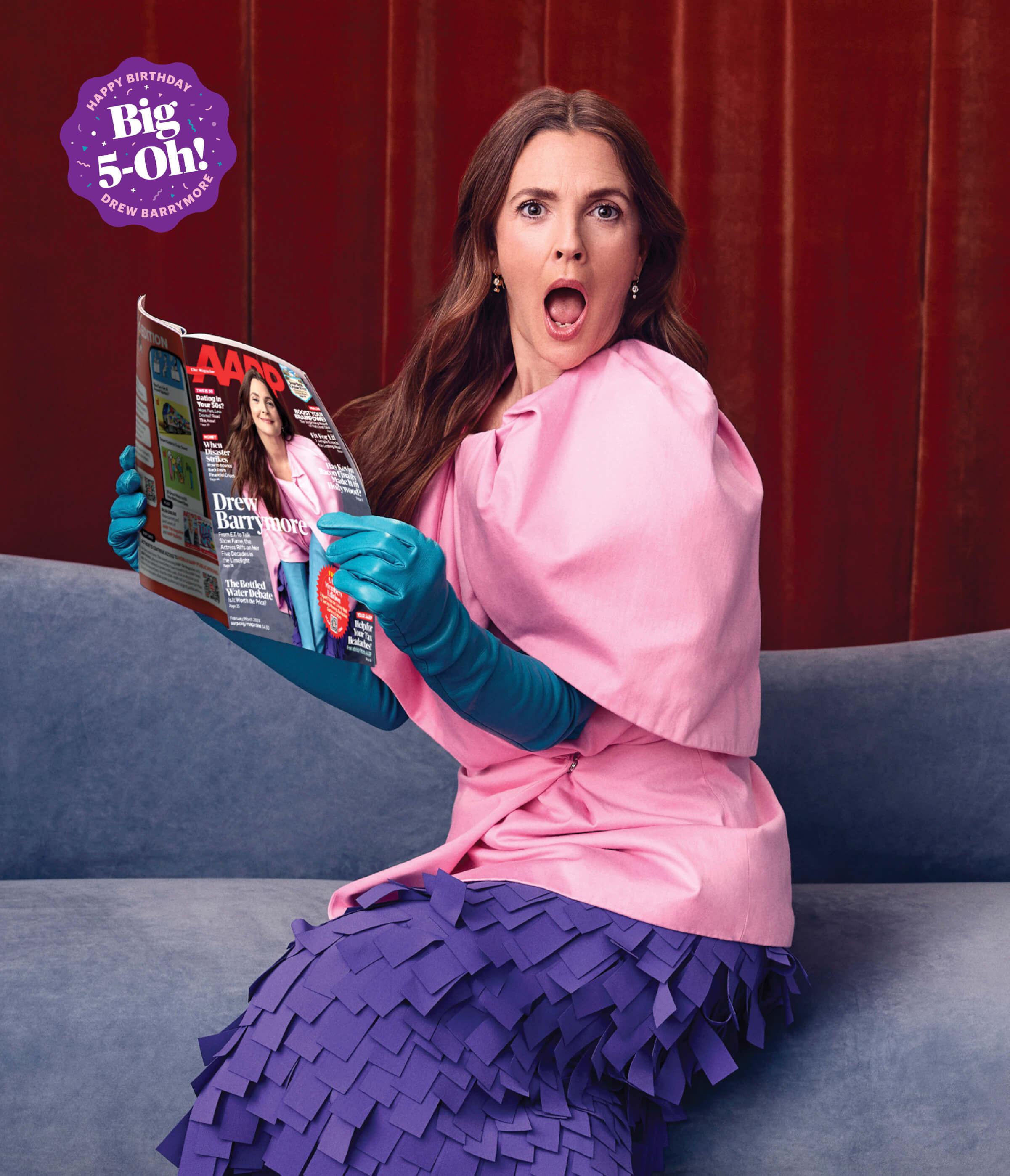
Drew Barrymore, photographed for AARP in New York on November 14, 2024
AFTER DREW Barrymore recently finished a gleeful—and one imagines, exhausting—afternoon of dancing, hugging, singing, posing, cooking, noshing and hamming it up with guests while taping an episode of her talk show, The Drew Barrymore Show, the cameras in a midtown Manhattan studio stopped rolling.
But the actress-turned-television host’s most important work as a BFF to millions of adoring fans had just begun. It was time to wander into the predominantly female audience, cameras off, and get into some heavy-duty baring of the soul—in short, girl talk.
“I feel lost,” one woman cried into a microphone, saying she’d barely dragged herself out of bed that morning. Barrymore raced up an aisle—her rescue dog, Douglas, in tow—plopped down next to the woman and threw an arm around her.
“You are beautiful,” she insisted in her signature Valleyspeak lilt. Then she stood up and called out to the other women in the studio. “We’ve got to turn off the nasty critics in our head,” she urged, weaving her way through the group. “I hate that critic! I want to love myself. Don’t you?”
The audience stood and cheered. “Yes! We do!”
And yes, you better believe it. Drew Barrymore—who partied at Studio 54 as a kid, whose troubled teen years spilled onto tabloid covers, who parlayed that bad-girl image into B movies in the early ’90s and posed for Playboy at 19—is today an inspirational, wise sister sage to her followers.
And why not? She has played many roles on and off the screen. For many of us she’ll always be the pigtailed cutie pie Gertie in Steven Spielberg’s iconic fantasy, E.T. the Extra-Terrestrial, in 1982. For others, she’s the big sis or kooky friend from her female-empowerment chick flicks and rom-coms of the later ’90s and early aughts (Never Been Kissed, The Wedding Singer, 50 First Dates, Charlie’s Angels).
Either way, she’s family. And she has been a vulnerable, open book with the public, sharing details of her roller-coaster life in two memoirs (1990’s Little Girl Lost and 2014’s Wildflower) during her journey from then to now.
This month, Barrymore turns 50.
But it doesn’t shock or worry her in the least. In fact, “I’m thrilled,” she says, as we make our way backstage at the CBS Broadcast Center.
“[Grey’s Anatomy’s] Ellen Pompeo was on the show, and she described turning 50 as getting this superpower where you finally stop fretting and driving yourself crazy,” Barrymore says. It’s a superpower she covets after her third marriage—to actor Will Kopelman—ended in heartbreaking divorce in 2016. She’s been juggling work and co-raising their two daughters Olive, 12, and Frankie, 10, ever since.
“This last decade,” says Barrymore, with a sigh, “has been ass-kicking.”
YET LATELY she has not only survived, but moved onward and upward. I’ve interviewed her four times over 20 years and am happy to report that despite the years of arse-whoopin’, she’s been restored to what I think of as her effervescent, bubbly core, while also owning a surprising new maturity.
Backstage now, she slips into a purple, green and fuchsia outfit—a whimsical Sex and the City meets Dr. Seuss ensemble. Someone puts on a moody Gigi Perez tune.
“This is my favorite song!” she cries, bouncing in her heels. “Turn it up!”
As she kisses puppy Douglas, Barrymore unconsciously poses, like a consummate professional who has got showbiz pumping through her veins, which of course she does.
Born into the British-American Barrymore acting dynasty (great-uncle Lionel, great-aunt Ethel, father John Drew and many more) Barrymore was a natural, shooting her first commercial (for puppy food) before she was a year old. But her childhood was fragmented and her parents were often neglectful. They split before she was born, and her wild-child, aspiring actress mom, Jaid, raised Drew with few rules and plenty of partying. Her dad—an addict who died in 2004—was mostly absent.
That upbringing, and the sudden, epic success of E.T., led to a drinking problem by age 11, drug addiction by 12, followed by rehab, a suicide attempt, then 18 months in a psychiatric ward at Van Nuys Behavioral Health Hospital.
“I think I thought I was a bad girl,” she says now.
By the time Barrymore was 15, she was out of the hospital and an emancipated minor, living on her own in Los Angeles. She was also a movie star has-been and couldn’t find work, so she “changed the narrative,” she says, and transformed her screen image from cute to dangerous-sexy—in films like Poison Ivy.
“That was fun for a while,” she muses, “then I was like, ‘OK, now what?’ ”
In 1995, at 20, Barrymore took charge of her career and cofounded the production company Flower Films with friend (and, later, wife of Jimmy Fallon) Nancy Juvonen. Together the women have since produced a wealth of box office gold (1999’s Never Been Kissed and two Charlie’s Angels flicks) and the recent hit television show, Santa Clarita Diet, with meaty roles for Barrymore as quirky, lovable, daring women.
“Steven Spielberg and Flower Films were two giant tipping points in my life,” she says. “The third and biggest turning point for me was having kids.”
Being a mom has rocked her world to its core, she says. So much so, that she has currently sworn off men, booze and acting to focus on being “present” for her girls as she works on the fifth season of her Emmy-winning, feel-good talk show. For the Big 5-Oh, her only birthday wish is to cook with friends, hang out at home with Olive and Frankie, blare some Beatles, and “do some real middle-aged woman s---.”
After playing—both on and off film—the precocious kid, rebellious teen, rom-com queen and other personas, the only role Drew Barrymore wants to play today is a stable, happy version of herself. And she wants to help other women do the same.
“It took me years to find my way,” she says, “and now I want to be true to myself.”
But first, more girl talk ...
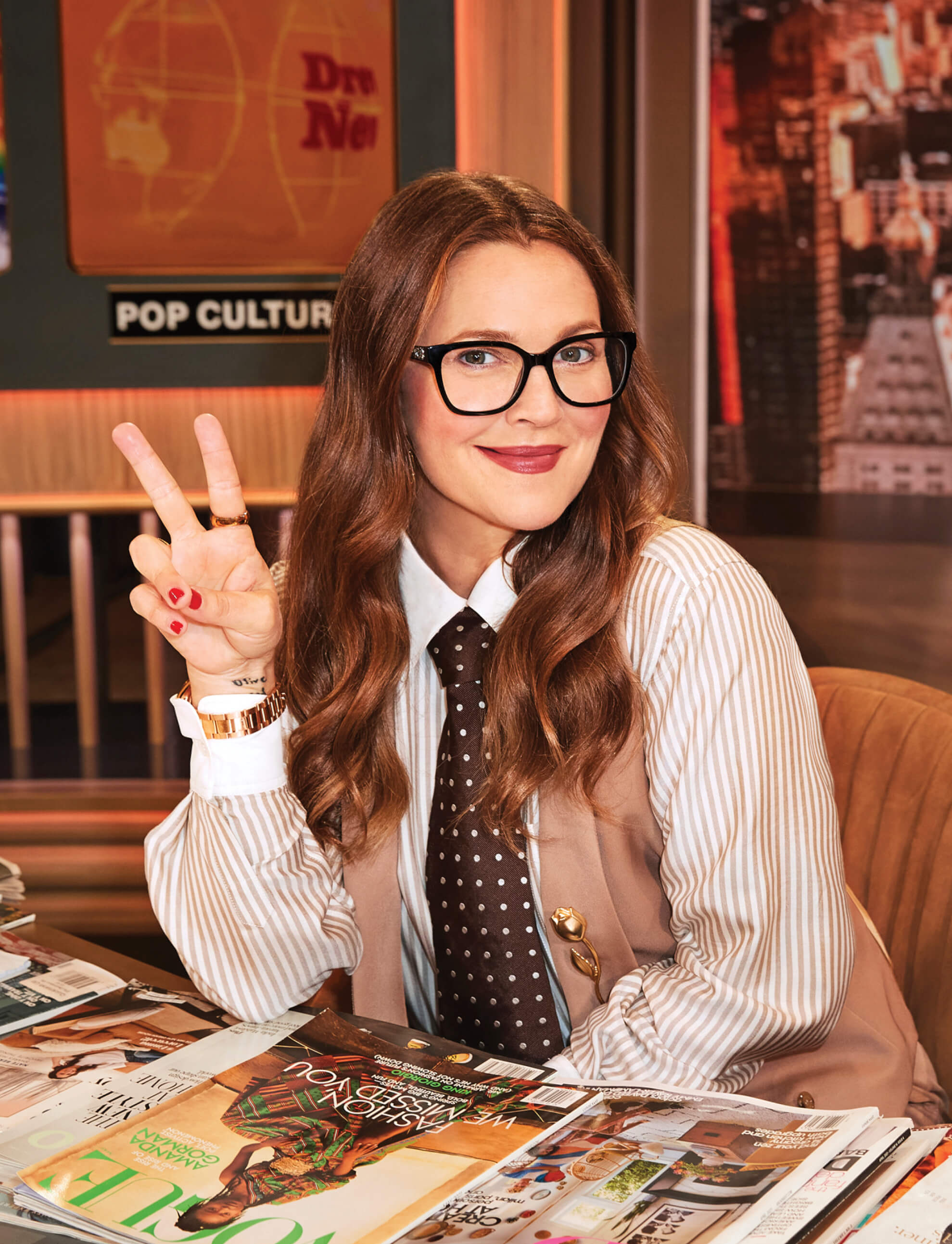
Drew Barrymore on the set of her show and with various guests
“I have no issues with aging—this is the happiest I’ve been in my life!”
Q. It’s going to be a full moon tonight, so I’m thinking it’s a perfect time for a heart-to-heart.
I know! I checked my moon tracker app. It’s a beaver moon, a supermoon—which means it’s much closer to earth. I’m so emotional.
Q. Yesterday as I watched the taping of your show, you told the audience you were “out of your mind” PMS-ing, and hundreds of women nodded in unison.
Totally. In one day, we covered gynecology, hot flashes, pooping in your pants, PMS—and we weren’t even doing a medical show! Sometimes when I’m waiting to walk out, I’ll have a lot of stuff on my plate—I’m worried about my parent-teacher conference meeting that didn’t go perfectly. Or I just fell 3 feet and hurt my ankle, and I’ve got to go to an MRI that afternoon. But then I limp out and say, “Can we just be real about this? Let’s put it all out there. Let’s cheer each other on. Let’s laugh. Let’s cry. Let’s call each other out on our s---. It’s special, so let’s not fake it.”
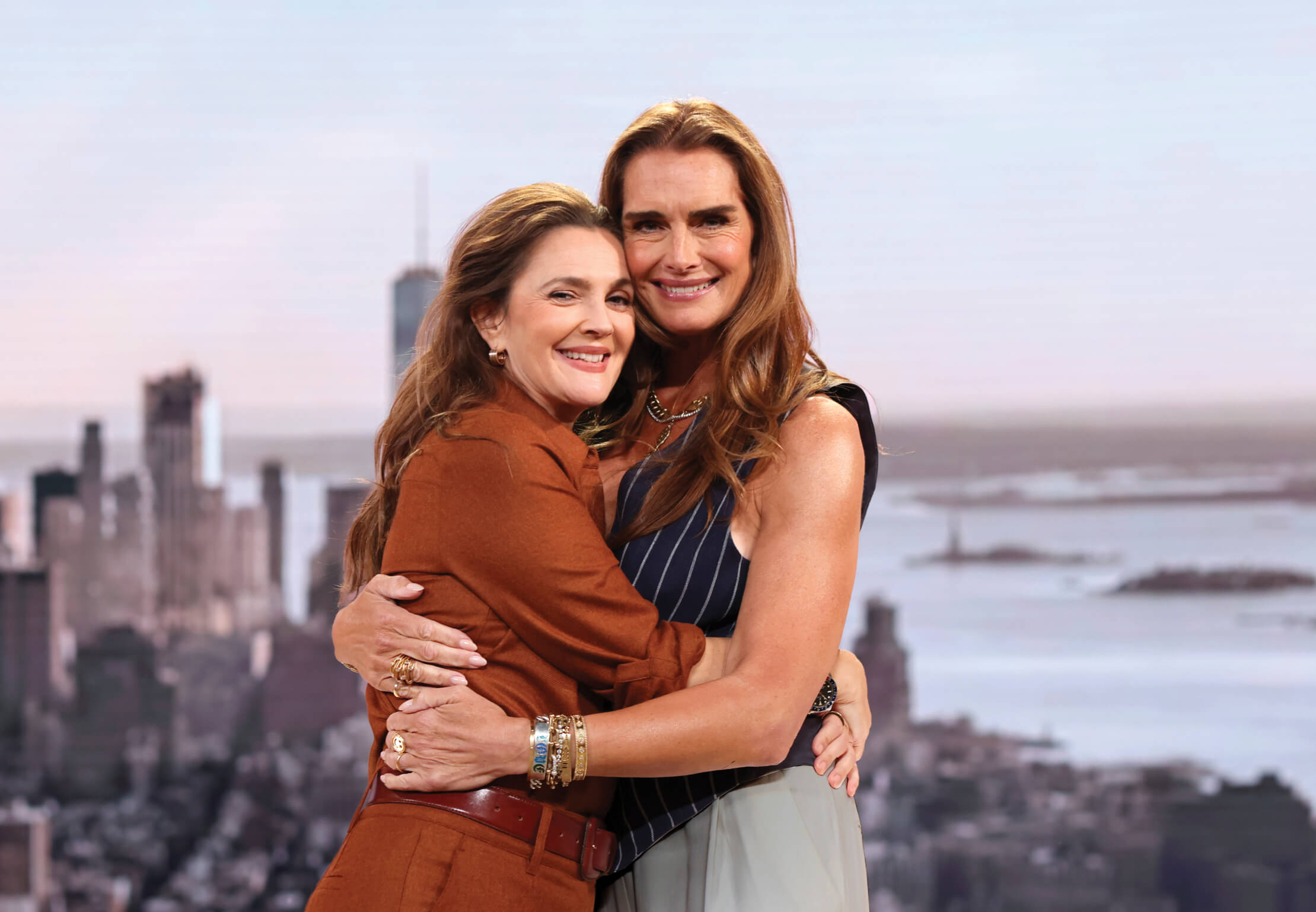
With Brooke Shields
Q. Plus, they’re not strangers. We’ve grown up with you, since you were a kid in E.T.
Yup. I think that should be the name of my show, “We Grew Up Together.”
Q. Your audience feels so connected, almost as if you were leading an intimate group therapy session.
I never thought this show would relate back to when I was in an institution as a teen. But the show is just like that room we’d go into every Wednesday night, with everyone lined up in their chairs around the walls. And someone different would go into the middle of the circle and put it all out there. These kids would just talk. It was funny and heartbreaking, but cathartic. And I thought, that is what this room feels like on the show—welcoming.
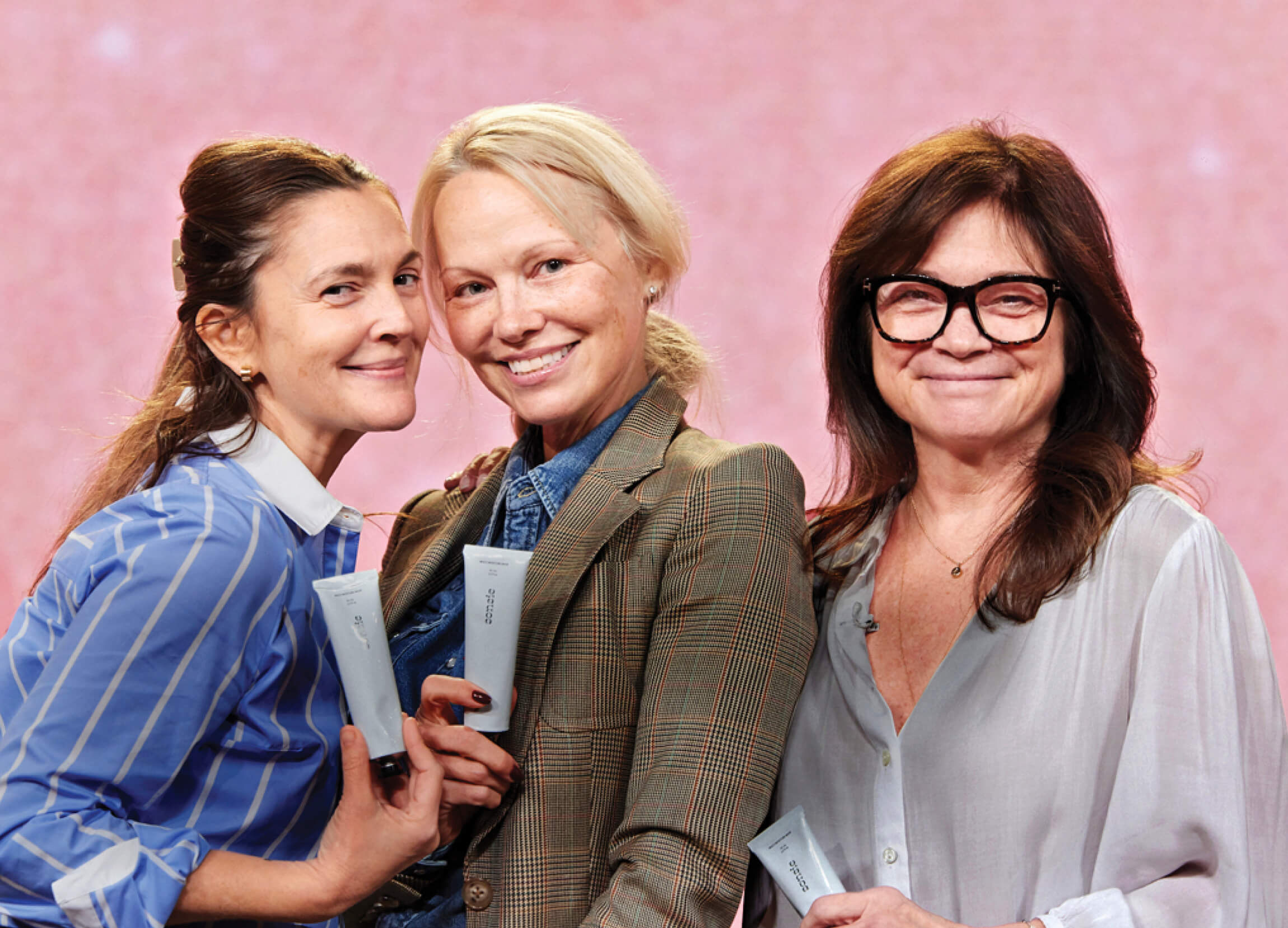
With Pamela Anderson, Valerie Bertinelli
Q. On the show you have your own touchy-feely interview style—which some criticize, but it works—it’s very you.
Thank you. I was terrified when I started. I felt very insecure and suffered a sort of impostor syndrome, judging myself. We launched in the pandemic and if we did get to talk to somebody live, it was on Zoom. I had time-management issues—the interviews would go on for 30, 40 minutes and people would be like, “How do you make a television show if you’re taking two hours of film to make 42 minutes of film time?” Five years in, it’s getting a lot better. But it wasn’t overnight.
Q. How did you find your way?
Whenever I was interviewed by journalists, they had an agenda, a set of questions. Now I have a game plan going in, too. I do my research. I know where I’d like to start. I know I’ve got to finish at a certain point. But I’m not fanatical about following a set of questions—I love discovering anything surprising or natural that happens along the way.
Q. You come from a legendary acting family. Did you feel pressure to follow in their footsteps and stick with it?
Never. I always wanted to act. I really do thank my mom, even though it destroyed our relationship—I think we sacrificed being mother and daughter for this wild job. When I was 11 months old, she took me on an audition and I got a commercial. Then she got me to Steven Spielberg’s office somehow and he single-handedly changed my life by casting me in E.T. If I hadn’t wanted to do it, I wouldn’t have done it. But I mostly loved it. I loved the people I found along the way. I loved the weird travel, living in different places, seeing the world, seeing how different people live, getting to know this whole country from the inside out. It’s been educational, it’s been life-affirming, it’s been creative.
Q. What happened to you after E.T.?
I went through an awkward puberty. I was not that cute, model-y little kid. I was heavy. I had crazy hair. My eyes looked sad. It was real rough patch. At age 11 or 12, I couldn’t get work. Then I went into the institution, and everyone thought I was so screwed up. When I got out I was 15 and going on auditions but couldn’t get a job. I would sit there and they’d literally tell me, “You’re too fat. You’re too old. You’re too young. You’re too blond. You’re not blond enough.” I felt angry toward people who wanted to alter me to fit the mold. I thought, “That’s on you. I’m not going to allow you to make me not who I am.”
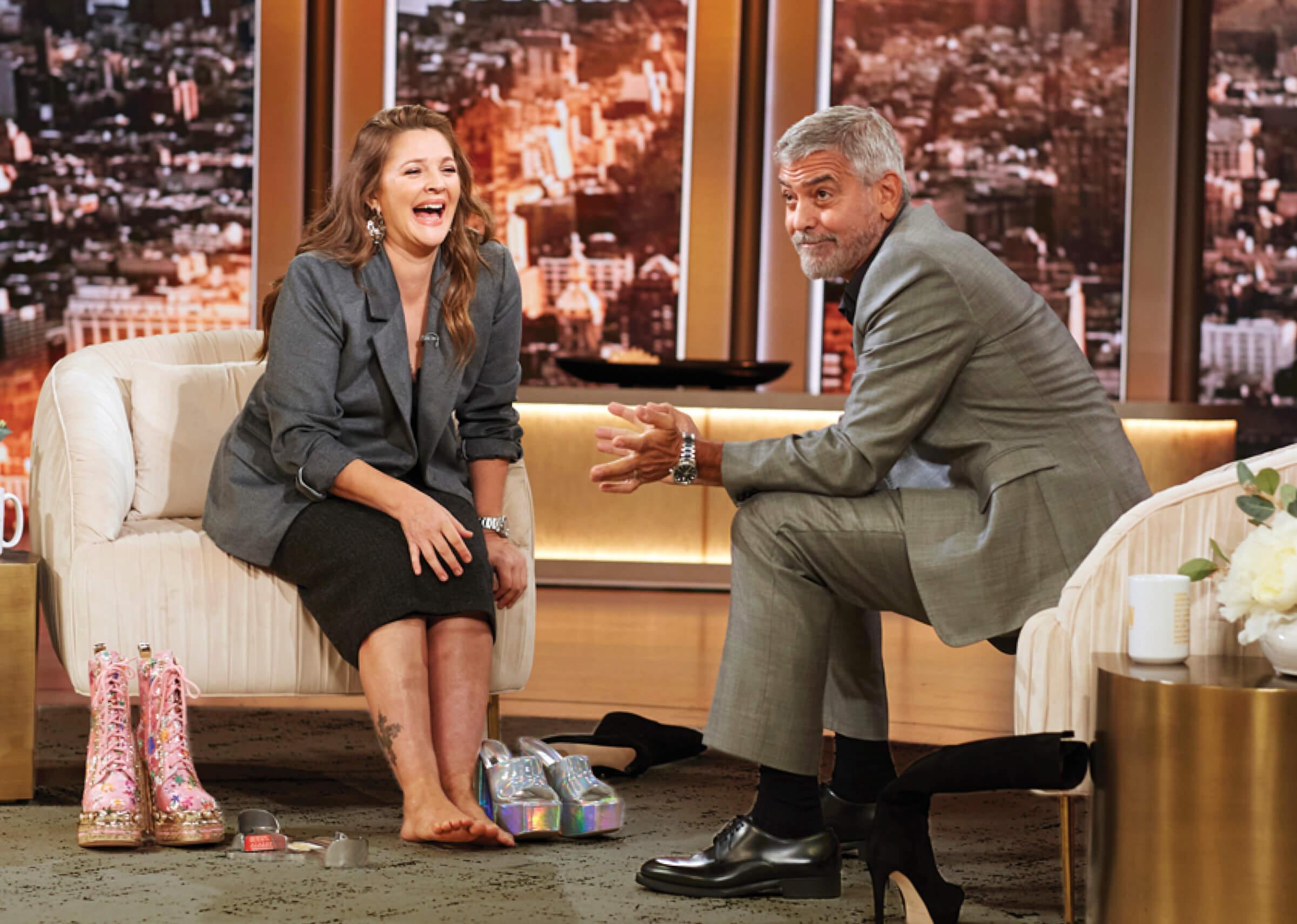
With George Clooney
Q. What did you do in the years that you weren’t working?
I was super artistic—taking pictures, painting, drawing and decorating. I was also hanging out with my friends. It was so much fun. It was the ’90s. People didn’t have phones. There wasn’t technology to take all your time up.
Q. After your rough patch, you became the “it girl” of the late ’90s and early aughts. You formed a production company, Flower Films, and found great roles for yourself. Gwen Stefani said the other day she wanted to be you back then.
Oh my God. So wild. So, it had been a solid 12, 14 years of a lot of pain associated with work. It wasn’t working. It was a wrong time. I’m actually surprised I kept going back to the well on something that did not seem to be the right fit. And even at 16, 17, I was doing B movies. It wasn’t until my early 20s when I did Ever After and Never Been Kissed and Wedding Singer, and all those types of movies when I was like, “Oh good. This thing I really love and I don’t question, there’s a space for me here.”
Q. You said acting has been educational. What have you learned?
I didn’t have a family and I really wanted one. E.T. taught me you could build families at work. Ever After taught me never to be someone who didn’t take care of themselves at the end of the day, who waits to be rescued, rather than rescuing themselves. That was the ultimate life lesson from that one. With Adam Sandler and The Wedding Singer, I learned you can form lifelong friendships. I stalked Adam and told him, “I have a premonition. It may sound crazy, but I believe you and I are supposed to work together numerous times. I don’t know why I think this, but I really do. And it’s so palpable. I have to tell you.” And I mean, we’ve done three movies, like one every 10 years, and it’s been really important to me. With Charlie’s Angels I learned that women can be the greatest support for each other, and that women can do anything that they want. And they don’t have to pretend to be men or hate men to do that.
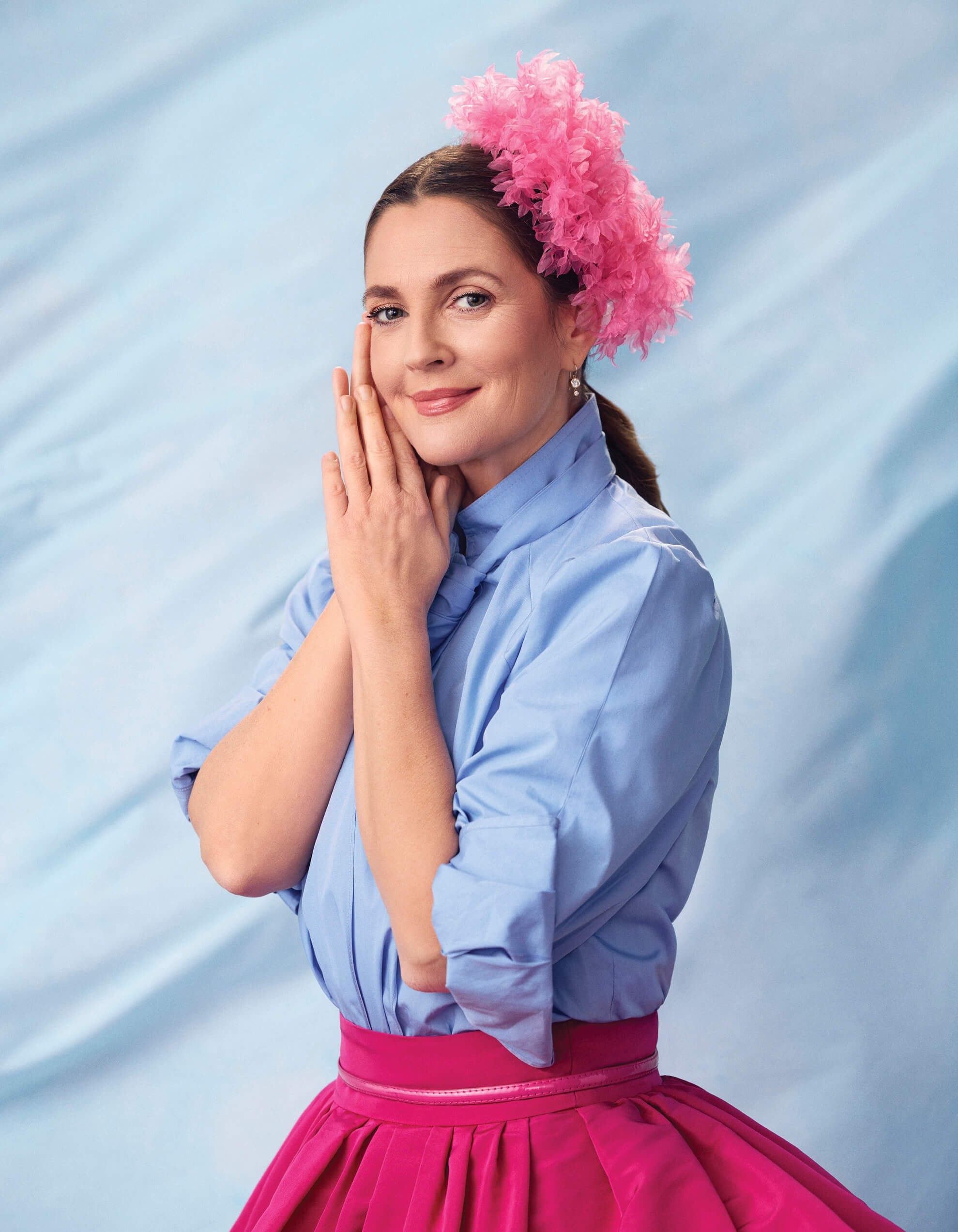
Q. Speaking of growing up, you have a milestone birthday coming up—the Big 5-0h.
It can’t come soon enough. I feel like Frodo [in The Lord of the Rings] I see that brass ring and I’m so excited! I have no issues with aging—this is the happiest I’ve been in my life.
Q. That’s quite a change from how you felt when your marriage to Will Kopelman ended in 2016.
At 40, I was married and having kids and was like, “Well, I’ve done this. I’m doing it. I’m in it.” But my dream, to have this solid family, did not happen. I thought nothing could be worse than what I went through as a kid, but the divorce was so much worse. It just shocked the s--- out of me. I really broke as a human being. I had two young kids and I didn’t know what I wanted to do for work or in life. My dream family was falling apart and I didn’t know how to put one foot in front of the other. And I had grown up so fast but now I didn’t know what age to feel—I just knew that my life was heavy, and painful and sad—and I sat in that for a while. Eventually, thank goodness, I lifted myself out of it. I had two kids and I had to figure it out. They’re literally worth everything, and I’m going to love them, and be inspired by them, and not be codependent. They can be my why, but I think I know how to do this without making them the center of my universe.
Q. Still, you took big breaks over the last decade after having your daughters, saying you didn’t feel comfortable “playing a character” anymore.
Not right now, no. Not while I’m my kids’ mom. It felt like I was cheating on myself, a professional cuckold. I was in my early 40s, and not learning how to be my own healthy, independent individual, how to be the parent I dream to be.
Being other people doesn’t help me figure that out right now. And the long hours of doing films were hours I wouldn’t have with my kids. I wasn’t going to do that.
Q. Do you still believe in happily ever after?
I think my dad leaving my mom before I was born made me very aware that nothing’s guaranteed. I invest in my relationships; I know they take work. I was like, I could either go into hardcore abandonment issues and be needy and screwed up, and untrusting, and take it out on the world and the people around me, or I can feel lucky, I can be grateful for those who stick around. I can work to be someone people want to stay around.
Q. You sound hopeful. Your great-uncle, Lionel Barrymore, was in one of the most hopeful, positive-message movies of all time, It’s a Wonderful Life.
I think we have all felt like George Bailey at different parts of our life. We’ve all been brought to our knees with pain and devastation, whether it happened to us or it was self-inflicted. Or we thought we’d never go through something that hard again, only to find ourselves in a place a long time later in something equally as devastating or maybe even worse. And you ask:“Can I handle all of this? Can I make it through this? Am I going to survive this?” And it’s so good when you do.
Q. What’s life like today with your girls?
We talk about everything. We love to laugh, we love humor. I say things that probably don’t sound very parent-like and I swear and I’m irreverent. Driving in the car with the girls and blasting music is the best. They are like musical libraries, always teaching me. I learned my current favorite song, Gigi Perez’s “Sailor Song” from Olive. Yeah, they’ll be teenagers soon. It’s funny when people say, “Oh, you’re in the good years.” I’m like, “Have you lived in my house? We have been through a lot of s--- here.” I think we’ll be prepared. It doesn’t mean it’s going to be easy, but we’ll get through it. We’re going to be good girls, not bad girls. My biggest thing to teach them is to be kind to people. Kind, safe, accountable. With a lot of funny.
Q. Do you see men and romance in your future?
My house is really full of a lot of women. It’s a constant hive feeling. My girlfriends are here. I work with other women. There’s a real commune feeling. It’s not like we’re in this lonely household. Would it be nice if someone came into my life? I don’t even know who fits into this. I date occasionally, but no way am I ready to open that door. My girls say I should go on dates, but I also know how I felt when men were around when I was little—it didn’t feel safe to me, so I’m probably overcautious from those experiences.
Q. Finding mom a new beau. Sounds like a reality show in the making ...
No way would I ever do a reality show. It’s funny you said I’m so open and vulnerable. Because I have clear boundaries. When we were launching the show during the pandemic, they floated the idea of doing it in my house. I was like, never. You don’t see my kids anywhere. They’re not on Instagram, they’re not up for grabs. I am so Doberman about that.
Q. You said to the audience the other day that you’re through beating yourself up, that it’s time to embrace happiness.
Yeah, I’m so sick of the guilt and sadness. It’s the greatest habit I will ever break in my life. The show helps: When I talk about beating myself up, I see heads nodding and I’m like, “We can’t do this to ourselves anymore. I’ve seen the light.” It doesn’t mean I’ve got it mastered, but I see the light enough to know that this isn’t good.
So the show is aiding me as a person and what I want to do as a female, as a parent, as a human, as someone who’s now curious about health in different ways. It’s an outlet for food, and design, and news, and all these things that I’m passionate about, but it’s much bigger than that at the same time—I proved to myself that I’m capable of change. I would have never guessed that I would feel peace. It’s been hard-earned. I would like to live the second half of my life like the B side of a record, not the same way as the A side.
Want More Drew?
For an exclusive behind-the-scenes video of Barrymore, visit aarp.org/drewbarrymore.
Natasha Stoynoff is an award-winning journalist and New York Times best-selling coauthor of 15 books who frequently writes about celebrities and culture for AARP The Magazine. Her most recent book is Bones: Anorexia, Anxiety, and My Path to Self-Love, with Robyn Shumer.
With additional reporting by Caitlin Rossmann
Five Decades of Drew
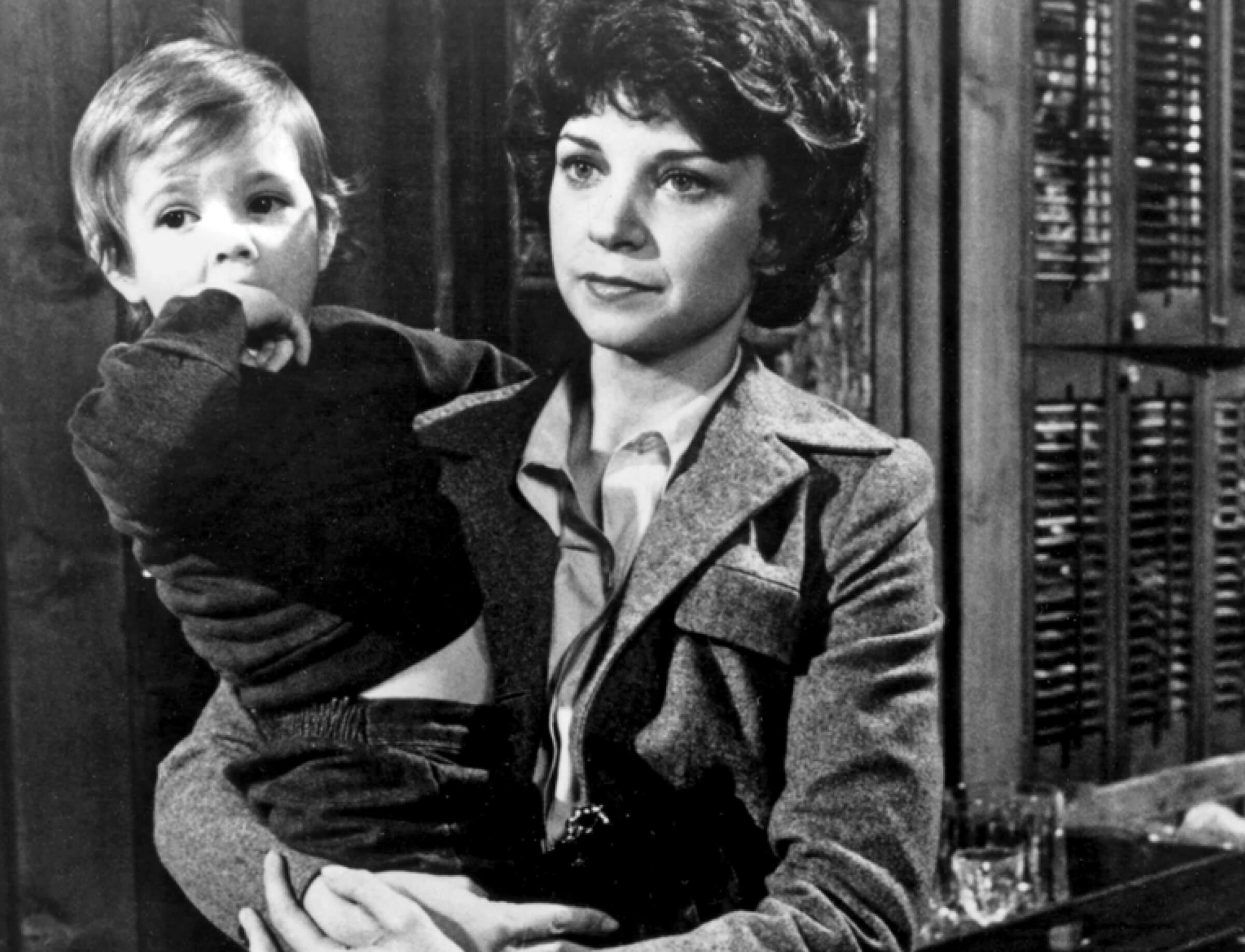
1978 TV debut in film Suddenly, Love, age 3
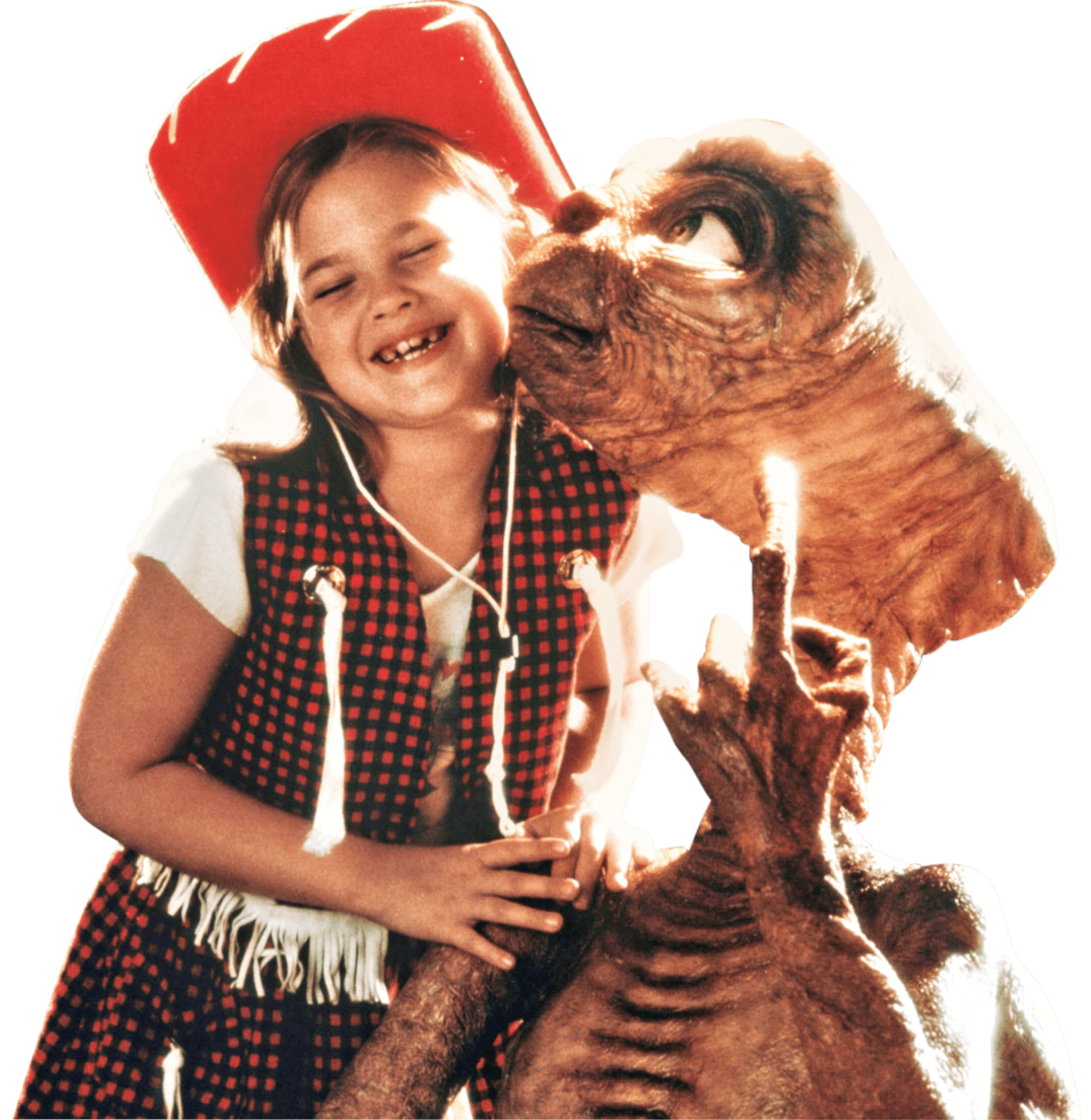
1982 E.T. and worldwide fame, age 7
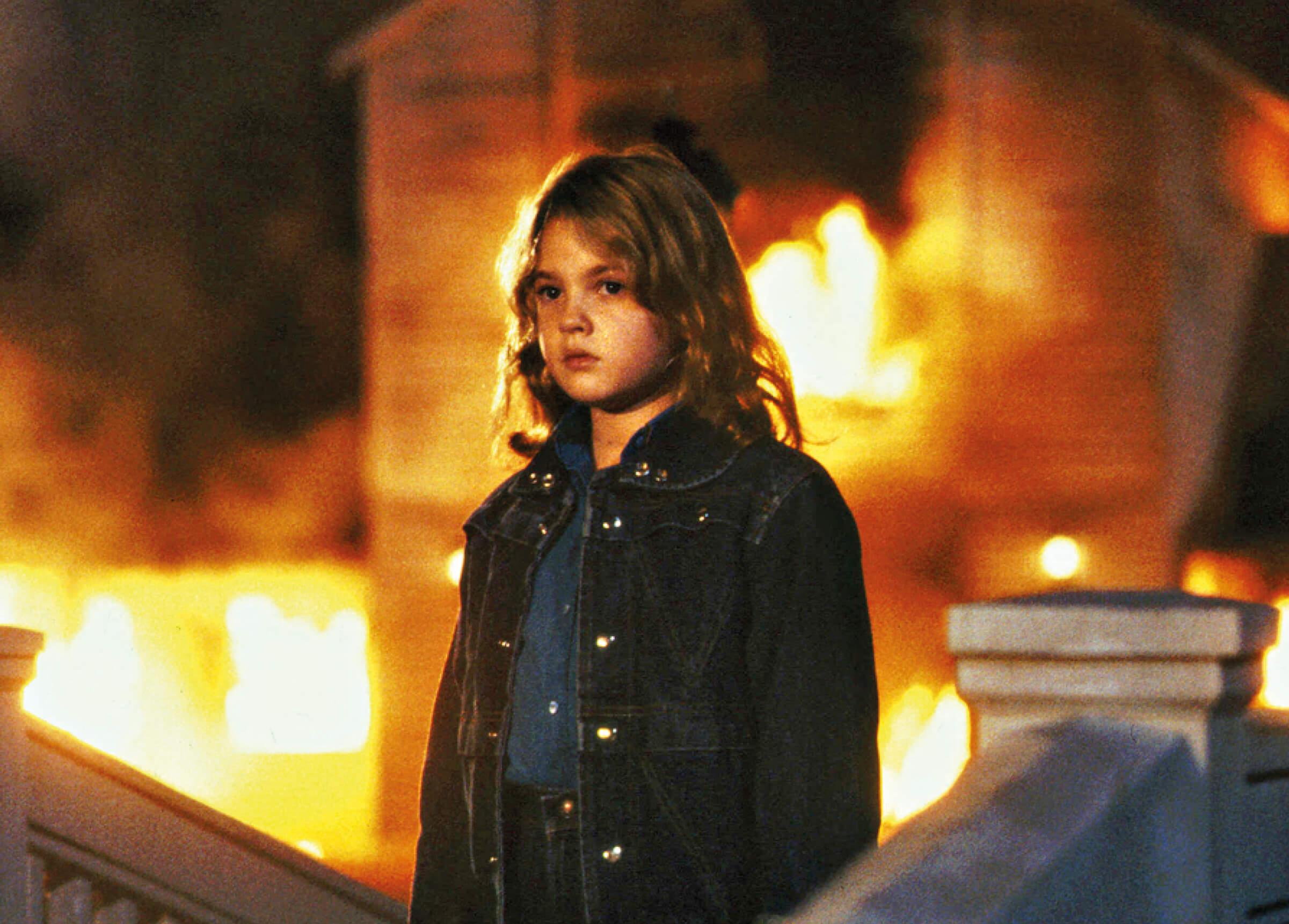
1984 First starring film role, in Firestarter, age 9
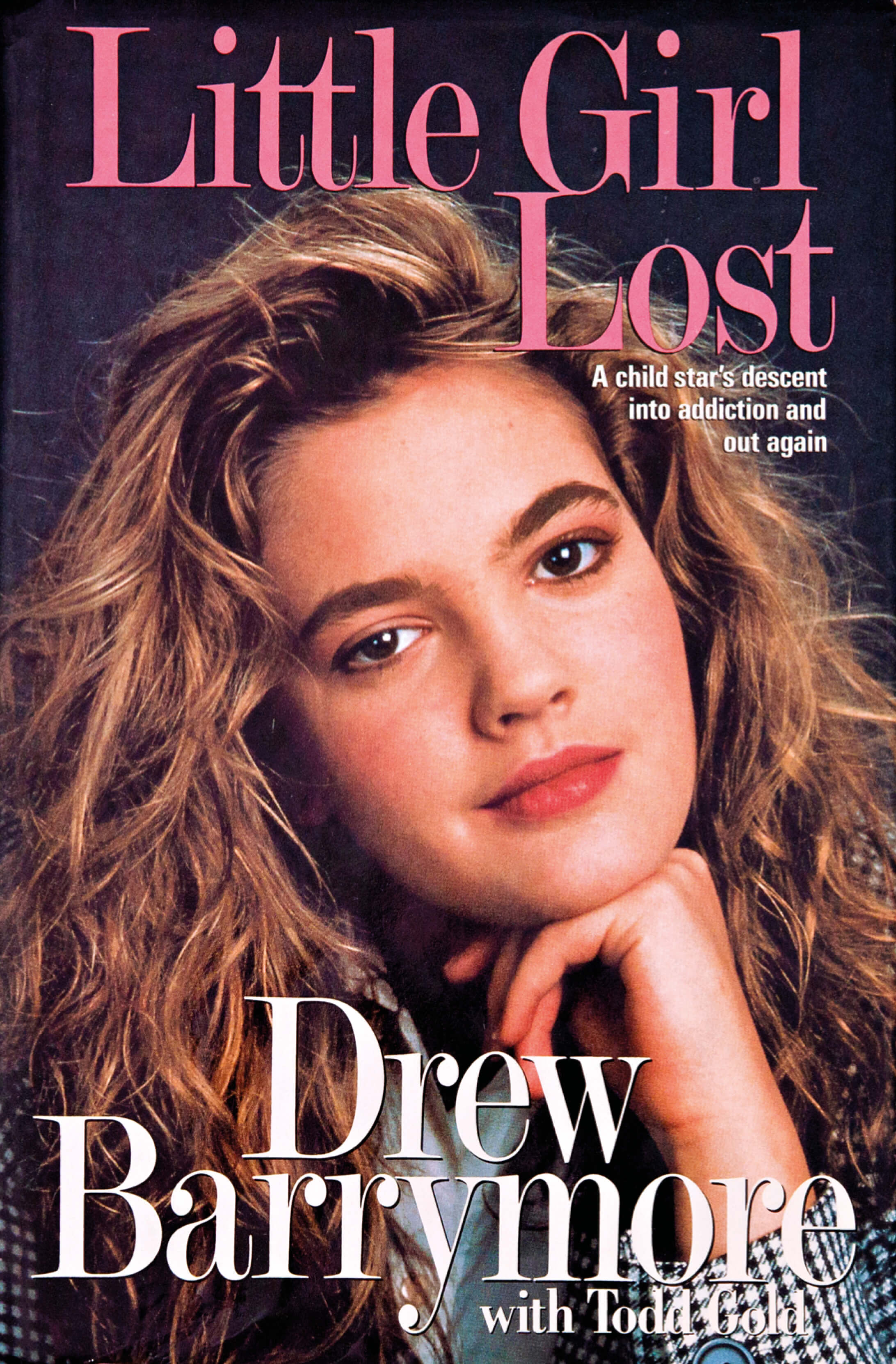
1990 Releases memoir, Little Girl Lost, age 14
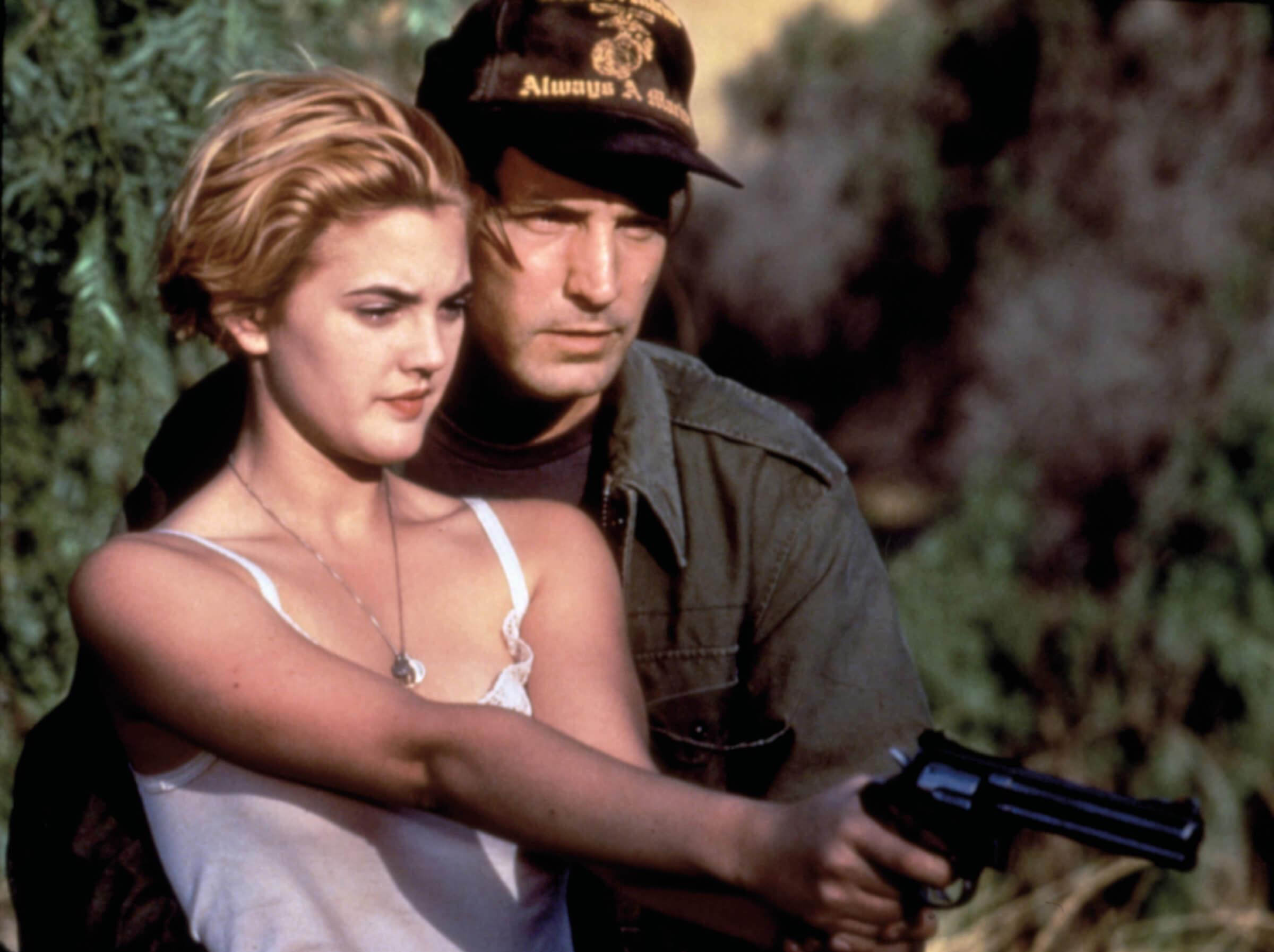
1992 Nominated for a Golden Globe best actress award for Guncrazy, age 17
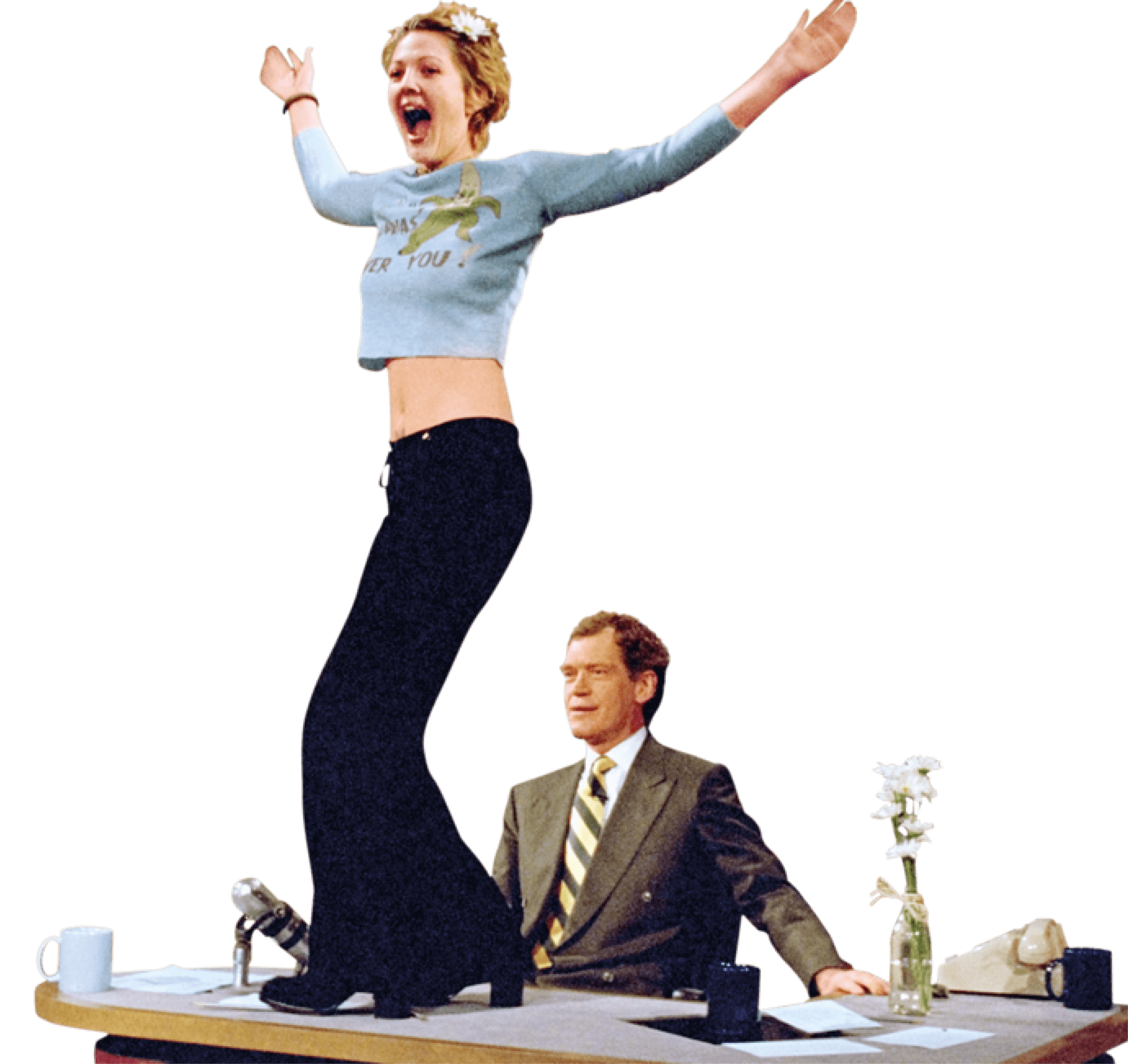
1995 Flashes David Letterman on Late Show with David Letterman, age 20
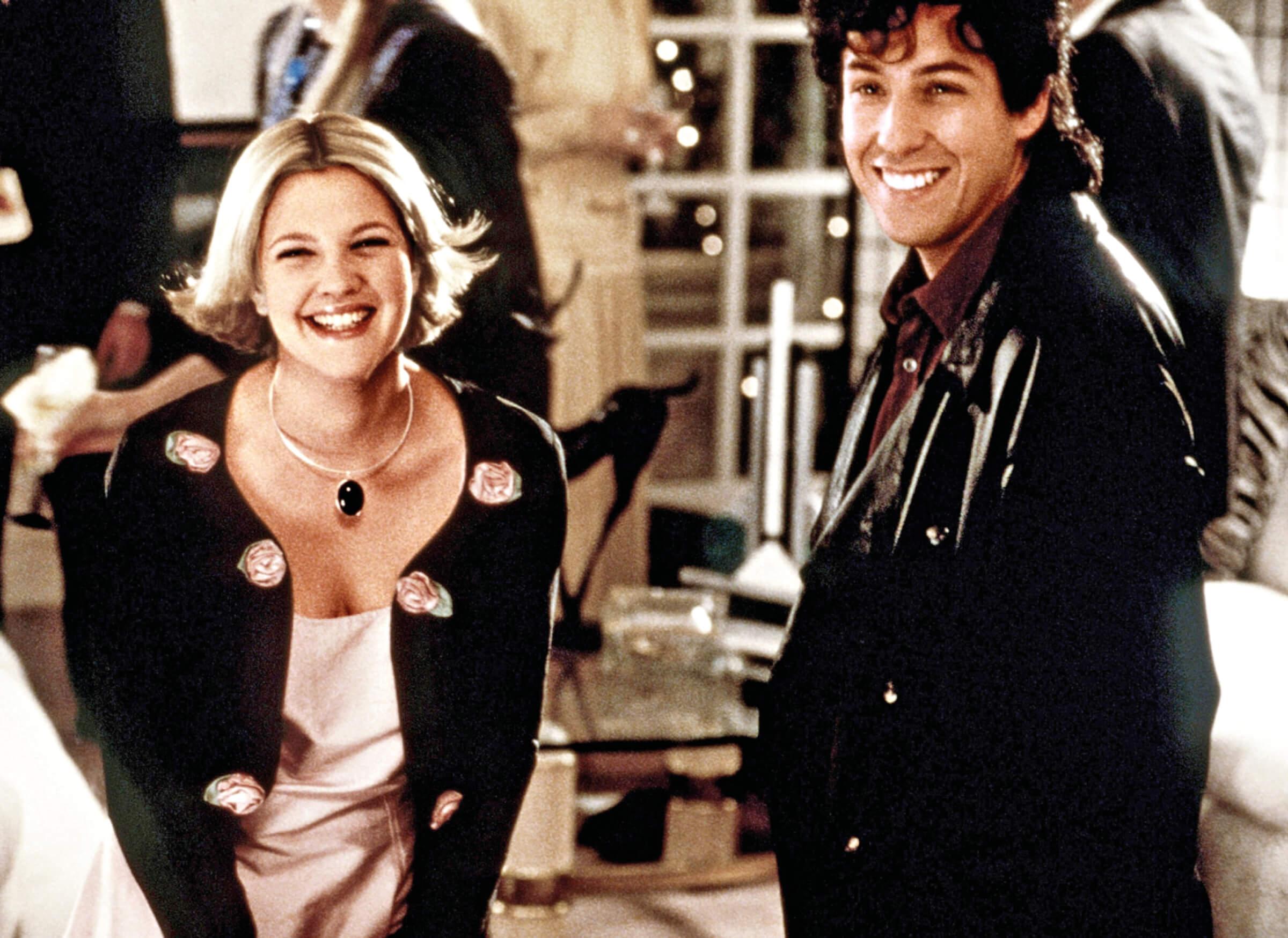
1998 Rom-com reign begins with The Wedding Singer, first of three films with Adam Sandler, age 23
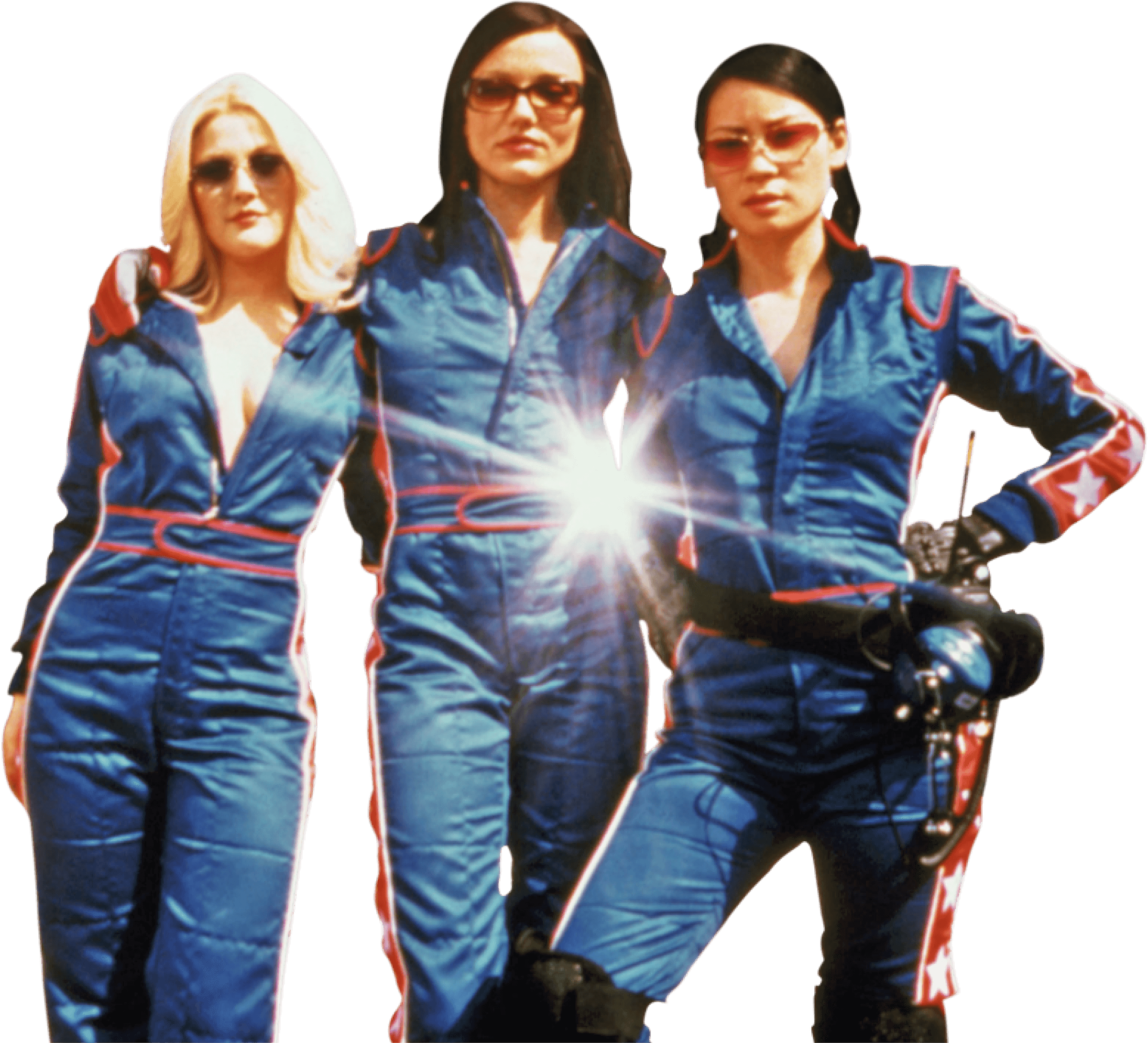
2000 Box office success with Charlie’s Angels, age 25
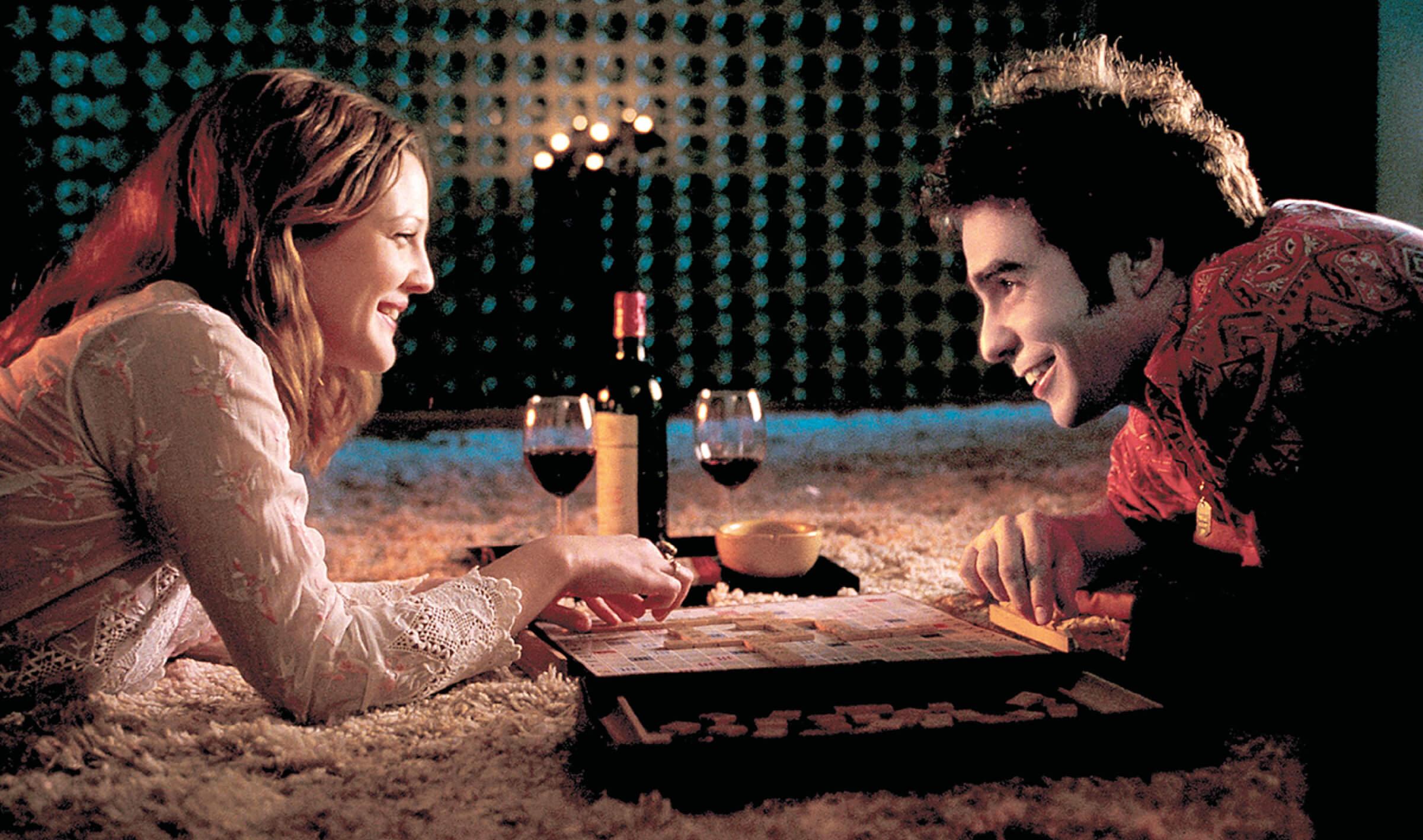
2002 Stars in George Clooney’s directorial debut, Confessions of a Dangerous Mind, age 27
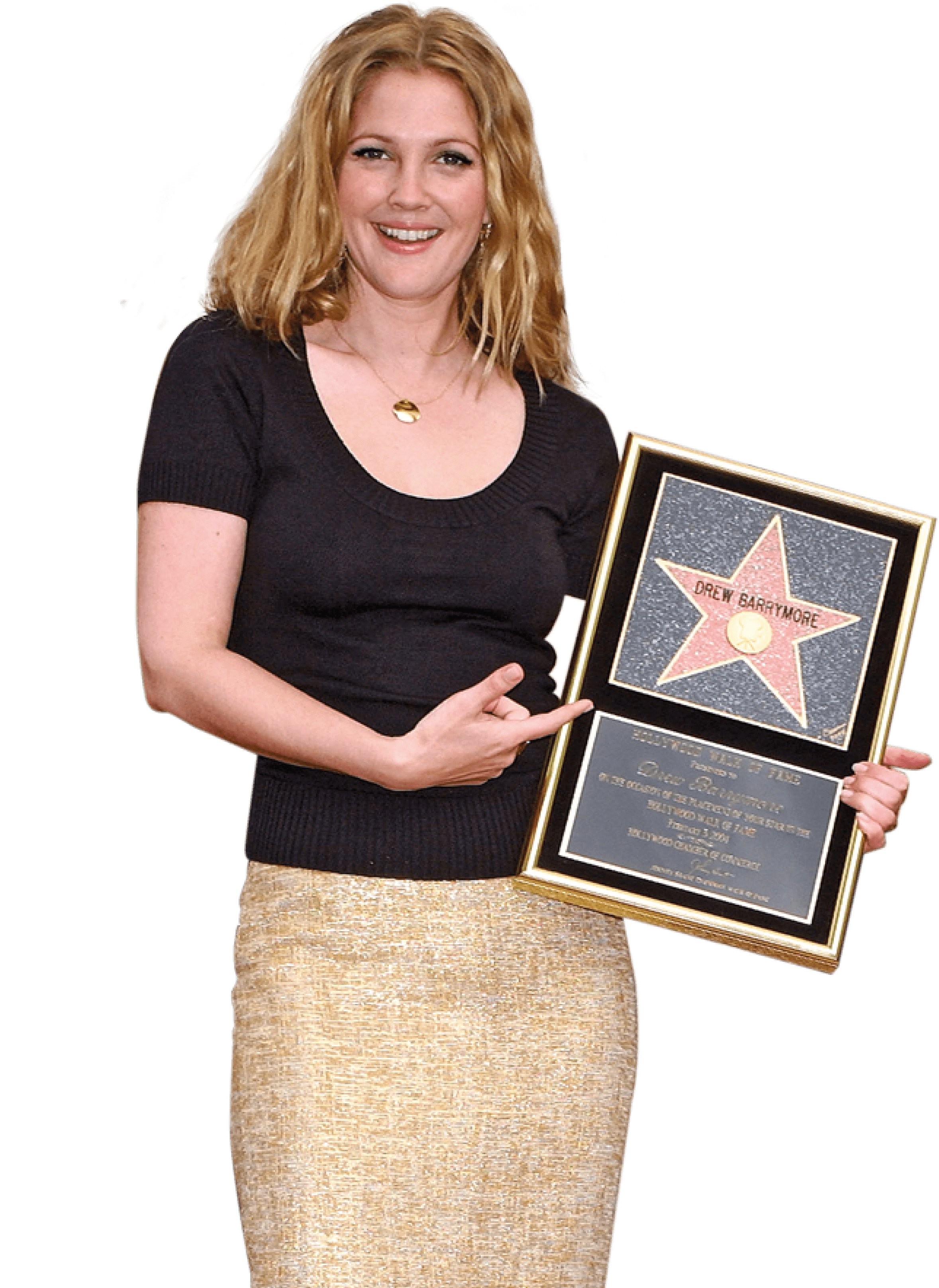
2004 Gets star on Hollywood Walk of Fame, age 28
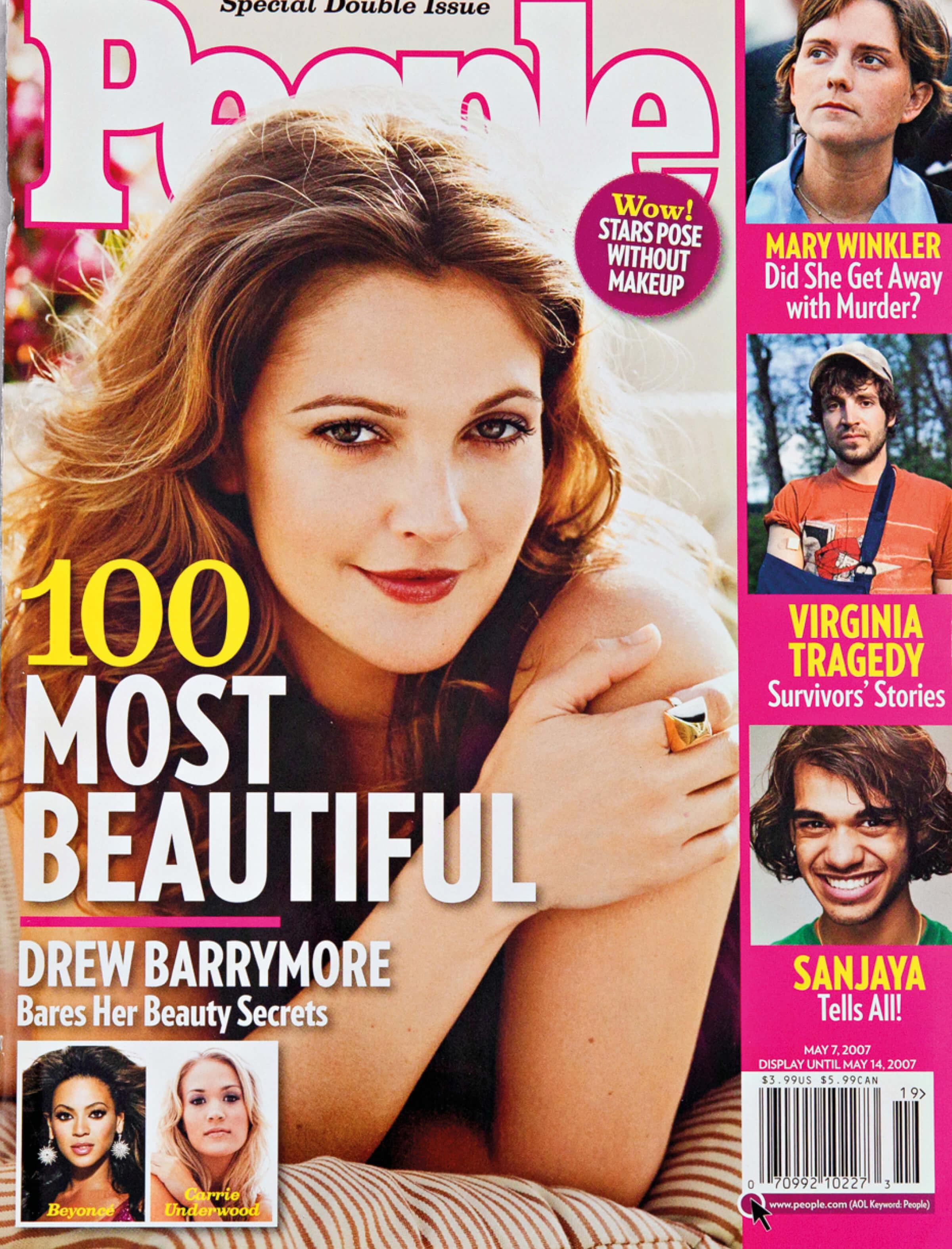
2007 People magazine cover for its “100 Most Beautiful,” age 32
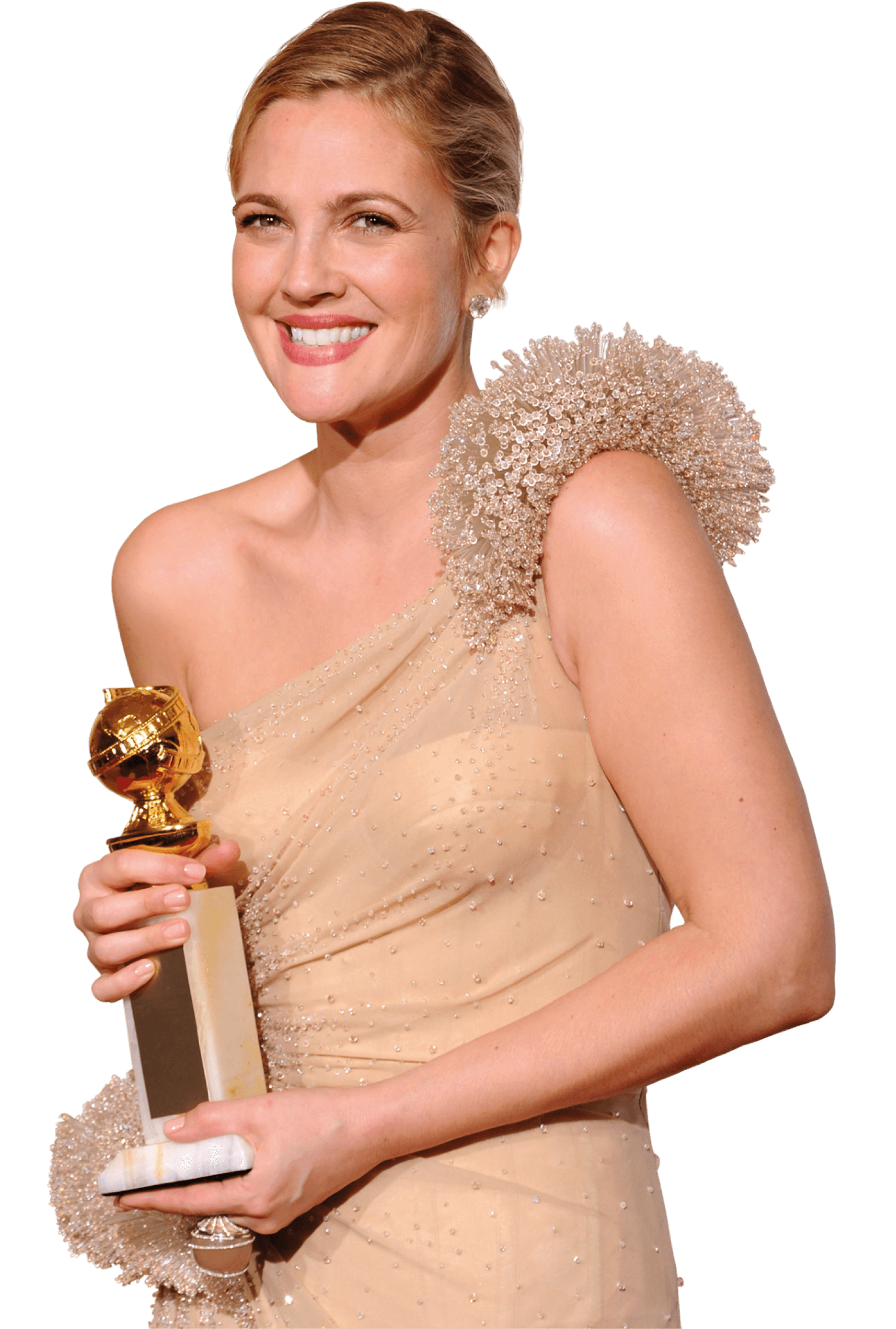
2010 Golden Globe, SAG best actress awards for Grey Gardens, age 34
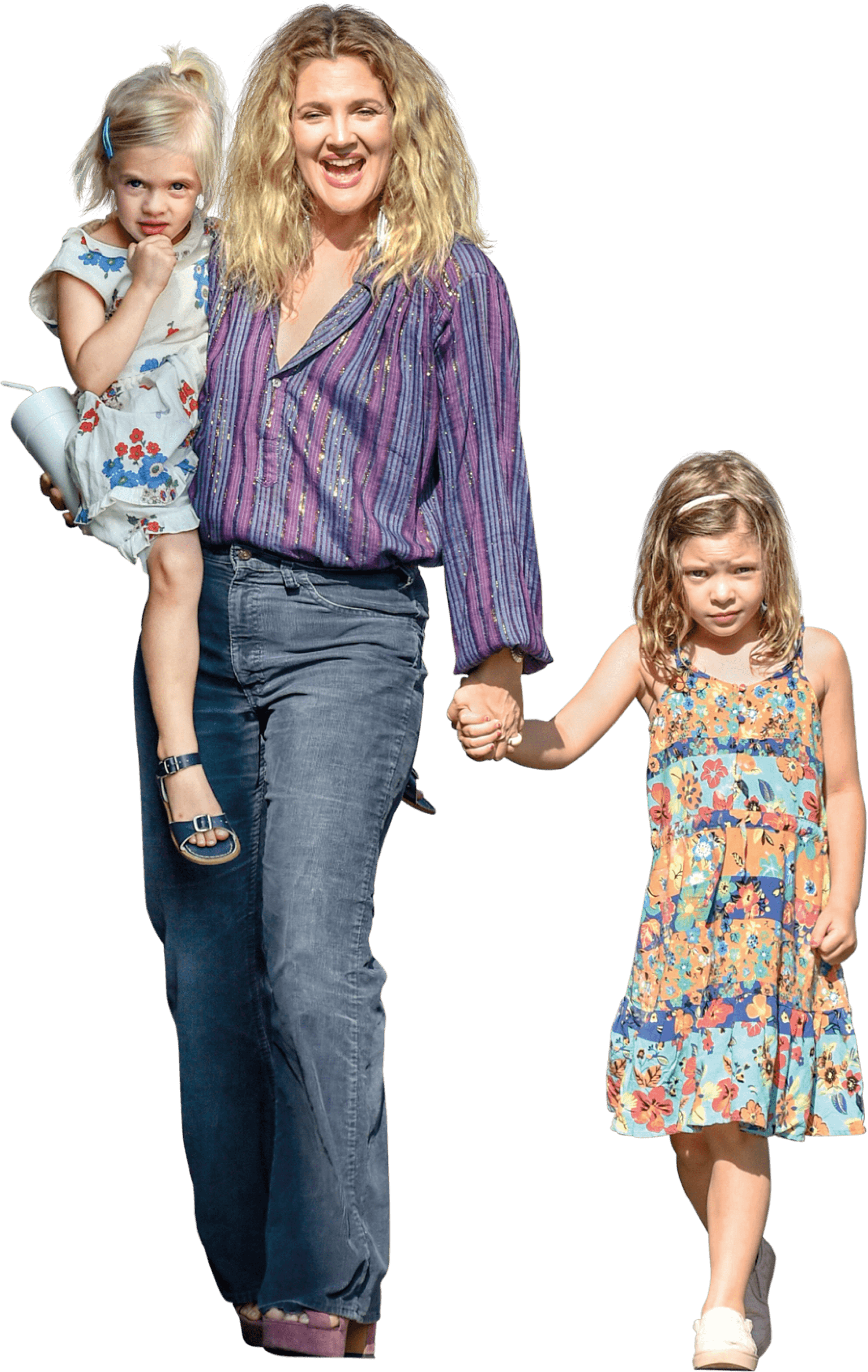
2012 Daughter Olive born, age 37
2014 Daughter Frankie born, age 39
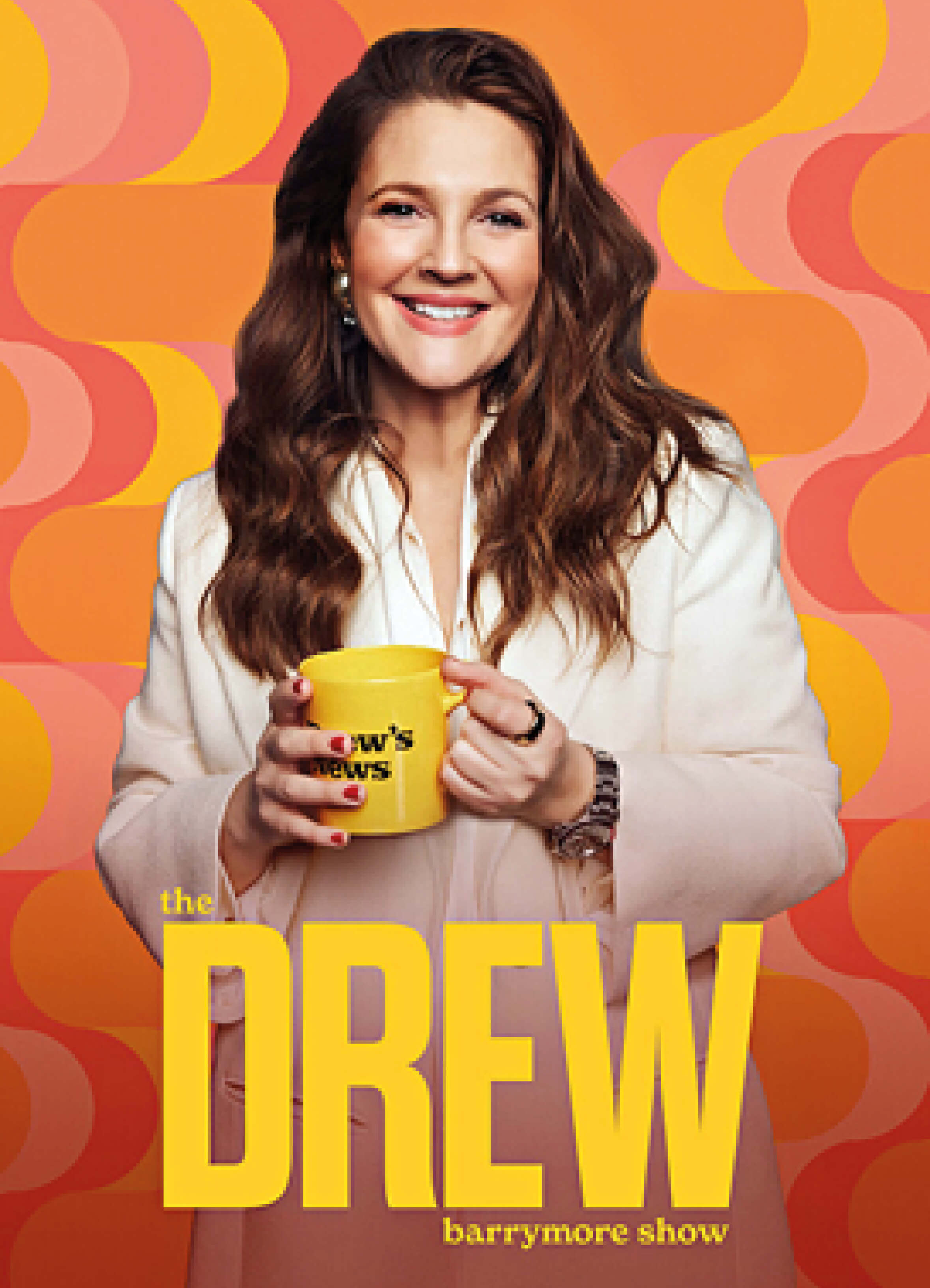
2020 Launches The Drew Barrymore Show, age 45
2020 Announces to Martha Stewart she’s taking a “hiatus” from acting, age 45
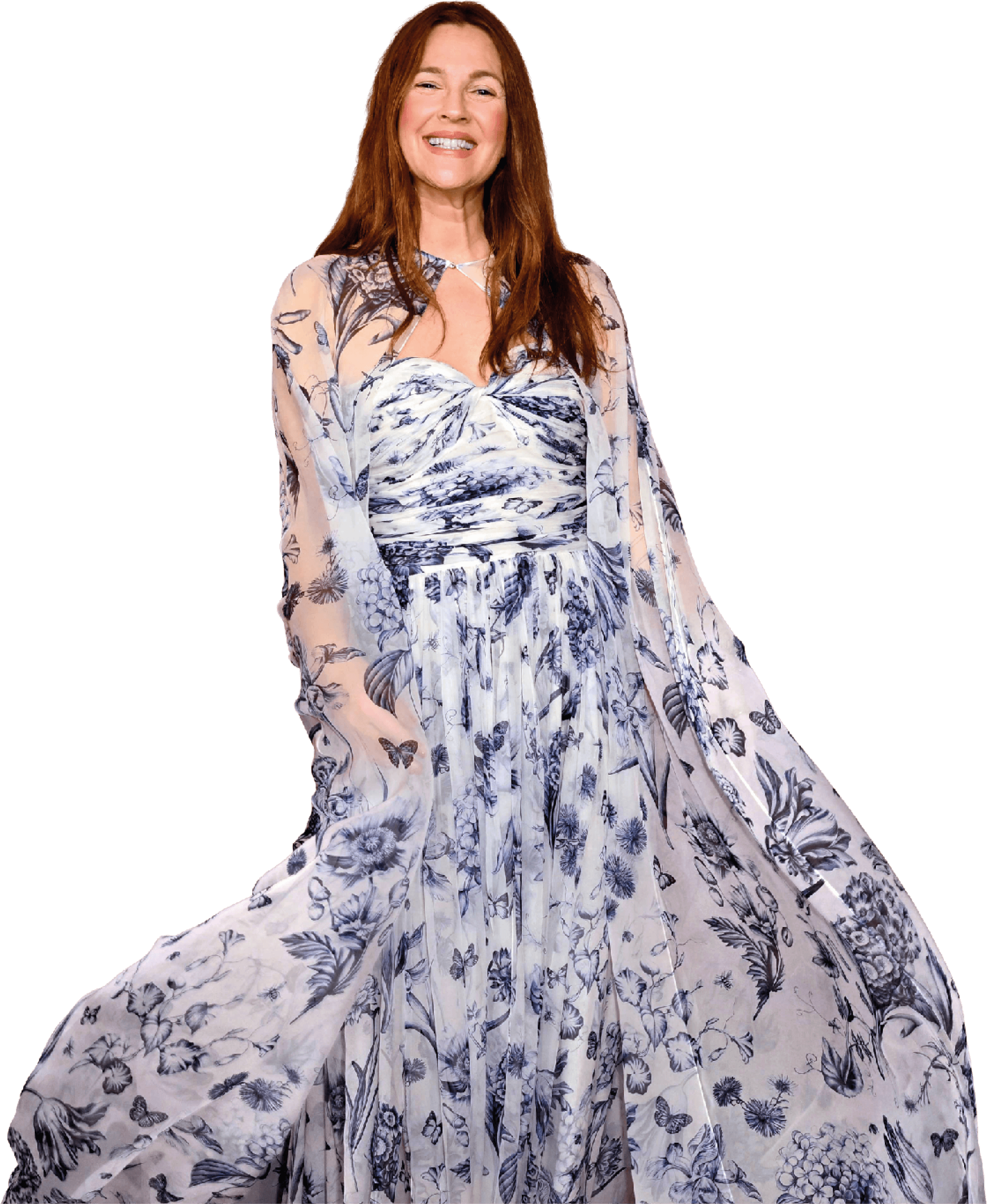
2023 Named one of the “Time 100” most influential people in the world, age 48
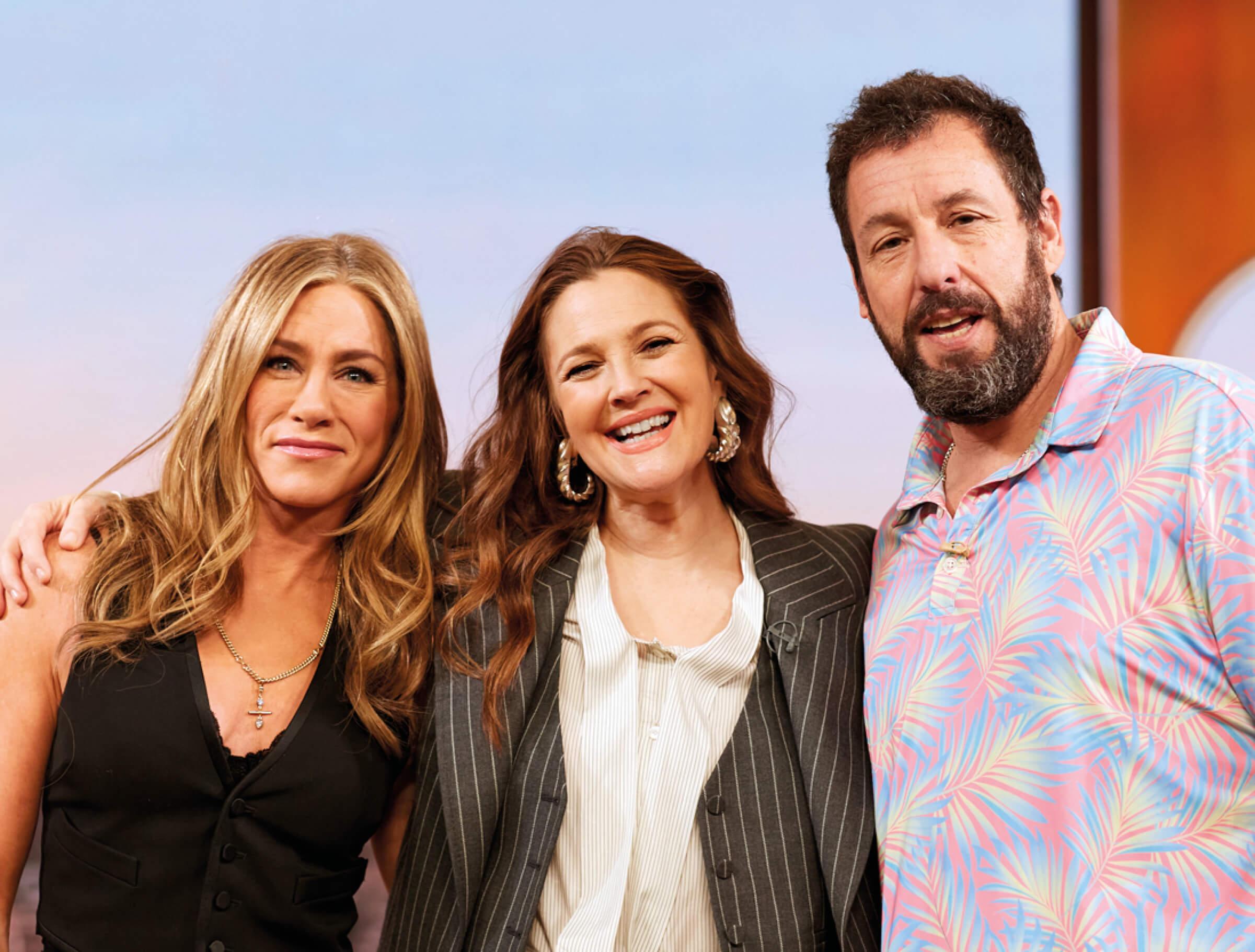
2023 Experiences first perimenopausal hot flash on her show while interviewing Adam Sandler and Jennifer Aniston, age 48
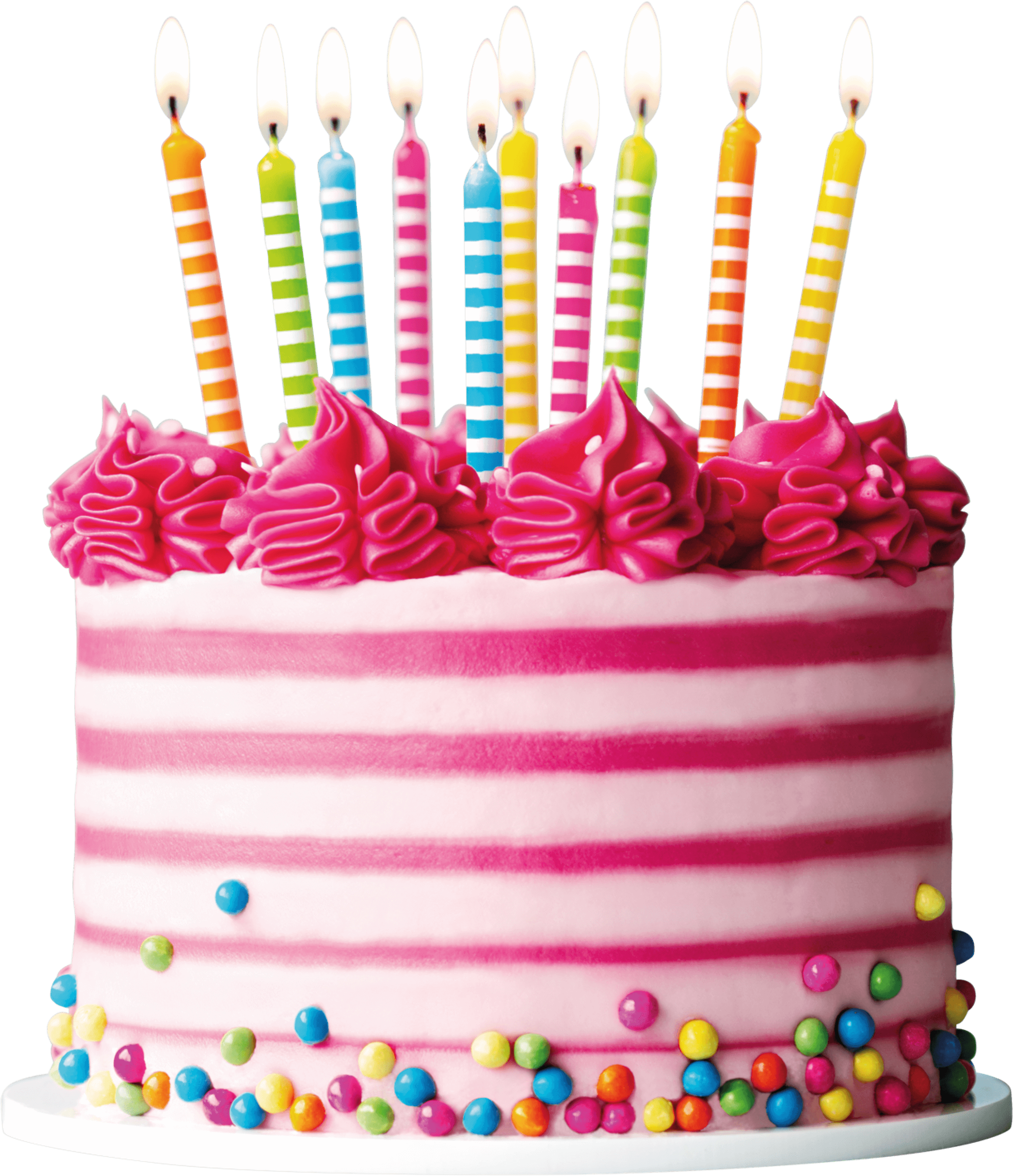
2025 February 22, turns 50, in New York City


For exclusive outtakes from Drew’s interview, go to aarp.org/morebarrymore.
Producer: Anderson Hopkins/Kindly Productions; Set Design: WayOut Studio; Wardrobe Stylist: Lee Harris for The Wall Group; Hair Stylist: Daniel Howell for Walter Schupfer Management; Makeup Artist:Lauren Lazaro Gulino for Walter Schupfer Management; Drew on set: Courtesy Ashley Bean/CBS (4); Five Decades of Drew: Courtesy Everett Collection; De Laurentiis/Paramount/Kobal/Shutterstock; First Look Pictures/Courtesy Everett Collection; Alan Singer/CBS via Getty Images; New Line/Courtesy Everett Collection; Courtesy Everett Collection; Miramax/courtesy Everett Collection; Gregg DeGuire/WireImage; AARP; Getty Images; Shutterstock; Courtesy CBS; Angela Weiss/AFP via Getty Images; The Drew Barrymore Show/Ash Bean; Stocksy.